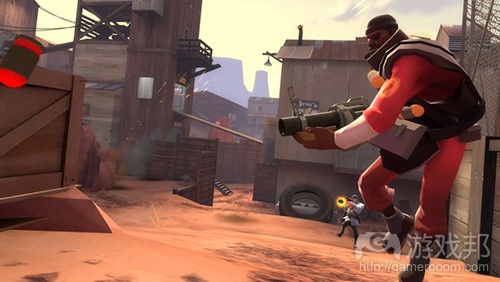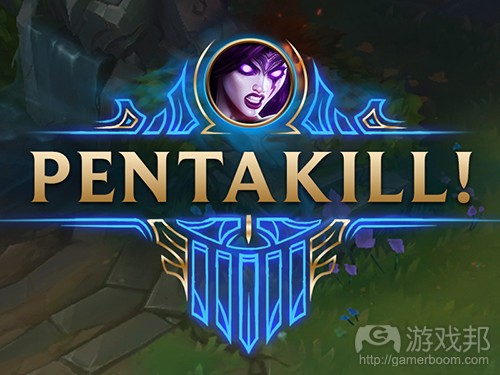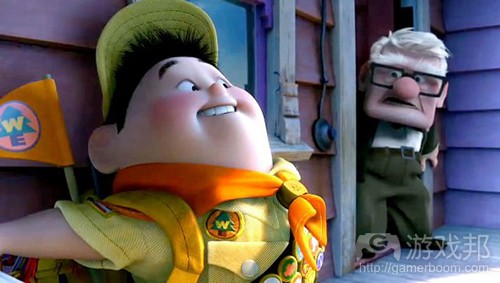如何避免在线竞争游戏中的消极玩家行为
作者:Keith Burgun
行业中有许多关于如何避免在线竞争型游戏玩家所出现的消极行为的讨论,对此我有一个不同的解决方法。
许多人讨厌或者害怕竞争这个理念,其原因并不难理解。除非你从小就在竞争文化中长大,否则你很难欣赏竞争的益处,而即使你真的从小深谙竞争文化,也很可能找到竞争令人讨厌的诸多原因。
提到竞争型电子游戏,我想大家都会联想到格斗游戏,第一人称射击游戏,RTS游戏,Dota类型等题材的游戏。而长期投身于这类游戏社区的玩家会发现,这些社区多少有点令人不快。换句话说,这些社区充满消极氛围,导致不少喜欢战略游戏的人宁愿体验单人模式,也不愿意跟大家一起玩游戏。
这一点可以理解,对于想通过玩游戏来放松或者将玩游戏视为逃避常规工作的人来说尤其如此。他们绝不希望在玩游戏的时候陷入另一轮情绪爆发的状态。
这并非竞争型游戏的内在本质。
我认为大家彼此攻击并非源于竞争的本质属性,而是来自我们对竞争的设计。如果我们想创造一个不含消极氛围的环境,就要注意自己所用的词语,图标,动作和图片。
我的观点是,这个问题与游戏玩法机制并没有多大联系。如果设计合理,相信我们只需重新包装《英雄联盟》,保留大部分甚至是所有的玩法机制,摒弃大部分的消极现象。
在此,我将以《英雄联盟》为例进行探讨。今天除了那些瞄准儿童和家庭用户的游戏之外,几乎任何热门竞争型游戏都有类似的问题。我以这款游戏为例并不仅仅因为它极受欢迎,而是认为它在暴力奇幻色彩、RPG机制和其他元素等许多方面来看都是一款精品电子游戏。
基于团队的FPS游戏主题
我过去是一名FPS游戏发烧友。正如人们所言,《反恐精英》玩家社区的氛围非常糟糕(至少在5年前是如此,现在的情况或许有所改观)。你会发现人们在其中恶语相向的情况跟日常生活中询问天气一样普遍。这个社区极排斥同性恋、女性,当然更讨厌新玩家,几乎人人都可能成为被攻击的靶子。我有相当长一段时间在玩CS,也领教过其中的污言秽语,只因为我喜欢CS(我至今认为它是史上最棒的FPS游戏之一)。
2008年采用类似功能,但主题完全不同的《军团要塞2》(TF2)发布了。它丰富多彩,具有卡通风格式的背景,迷人的角色以及搞笑的文案内容(我认为TF2博客写手是最搞笑的网络写手之一)。
尽管其主题不同于《雷神之锤》的黑暗奇幻主题,以及CS的现实军事主题,但我们仍然会发现这些主题具有许多共性。你在游戏中仍然要向对方投手榴弹和火箭,将对方炸成体无完肤的尸骨。你仍然要用枪支瞄准和射击,令他人血溅白墙。总之,你们仍然在相互厮杀。
尽管只是采用了相对较为适度的主题,玩家社区氛围却因此大为提升。我至今记得当时的情形,“嗯,好奇怪啊。大家都不再对我辱骂了……”人们彼此之间都很友好。
不仅如此,我还不止一次听到女性游戏玩家的声音。更奇怪的是,当女性玩家用语音聊天时,她们也很少受到骚扰,而如果真的受到骚扰,服务器那端就会有人批评这些骚扰者,或者直接将他们踢出去。
这究竟是怎么回事呢?我当时的感觉是TF2所做的这些小变化却创造了大进步,不但向玩家传递了“一起享受乐趣”这种更积极的信号,还吸引了更广泛的用户群体。
错误的提示
这里的问题是:我们向玩家输出了他们对彼此看法及两者关系的错误提示。你实际上并非残忍而无敌的杀手,对方也并非任人欺凌的新手级恶棍。对手关系并不是让你通过霸权获得荣耀。这并非游戏的本质属性,但我们的确传递了这个信息。
让我们想想《英雄联盟》的一些更为过分的例子。这款游戏的主题极重视“杀戮”这一特点。显然,你会因为杀戮而获得金子和经验值,在一定程度上这种举动也颇具意义。但是,游戏没有必要在你短时间完成两三次,甚至是四五次连杀时就以视听形式传达庆祝信号,用一个女声以激动的口吻宣告你的成就。
换句话说:你已经得到金子和经验值,也暂时在游戏中消灭了玩家对手,这已经足够作为一种奖励。游戏为何还要出现那些鼓励暴力行为的额外反馈?
这并非《英雄联盟》首创的新功能,该游戏还会向所有玩家宣布某人在未被杀戮的情况下完成多次连杀的消息。玩家还会得到不同的“头衔”,例如“无人可挡”,“神一般的存在”以及“战无不胜”等。有半数头衔实际上与游戏规则并无瓜葛,只是用于激发玩家的自负,让他们觉得自己真的“战无不胜”一样。
但“战无不胜”并非该游戏的目标。你可以一时得势但也还是会失势。游戏任务是接近目标,攻占线路,摧毁敌人,但这些都可以在玩家无需“战无不胜”的情况下完成。
更深层次的主题问题
我想许多人看到这里可能会说,当然这种游戏就是力量幻觉。人们喜欢这种幻觉,而这也正是问题的症结所在。
当然,人们喜欢这种幻觉。人们喜欢许多《英雄联盟》中实际上并不存在的东西。就因为人们喜欢看新闻,所以我们也许应该在屏幕顶端呈现新闻标签?或者呈现你最喜欢的烹饪视频,或者黄色视频?要知道很多人都喜欢看黄色视频啊!
人们还喜欢获胜,所以我们应该确保所有玩家在游戏中都能赢?我的观点是不能因为人们喜欢,就投其所好将其嵌入游戏中。将原本并无价值的东西添加到特定系统中有可能产生问题。
我想说这种战胜欲并非任何竞争型游戏的本质,如果使用不当则可能产生巨大的负面影响。
从机制层面来看,呈现力量幻觉的东西实际上可能曲扭玩家在游戏中的行为。玩家会做出一些次优举动,购买一些次优道具,只是为了深化那点小小的力量幻觉。
我认为这是一个严肃的机制性游戏设计问题,它导致玩家追逐一些奇怪的目标而非游戏的实际目标。
但从玩家体验层次来看,这还会产生其他问题。玩家A采用的是自己的统治策略,他想统治其他玩家,游戏也允许他这么做。但之后他的一个队友却破坏了他的计划,号召大家“追求真正的目标”,或者说他的团队解体了。无论是哪种情况,这个玩家都遭遇了计划受阻的情况。
关键在这里:当处于“我想获得统治权”这一心态的玩家在情况不妙时会被迫转向“我正在被他人统治”的思维。这些玩家在一定程度上处于一个统治环境中,如果他们失败了,有一部分人就会认为自己的整个世界都坍塌了。此时玩家就可能开始出现恐怖的行为举止。
所以他们就开始骂街吐槽,有时候是针对其他团队的玩家,但多数时候是逮着人就骂。他们绝望地指责自己的队友,这样自己就可以说“没错,我本来是占据优势的,但就是因为这个人把我们所有人拖下水,反正不是我的错!”
我想这些人多数充满戾气,如果你把他们带到一边给他们浇点冷水,没准他们会说这是谁的错没有关系,毕竟只是一款游戏——他们的身份又不是取决于资深玩家这种头衔,当然也不是由这场竞争的输赢来决定的。但在他们追逐统治权的时候,情况则相反。
从某种程度上来说,统治某人就是给予其非人的待遇。他们是少数人,他们不会是你们中的一员。为报复游戏中的这些人,你当然也以其人之道还治其人之身。这些游戏告诉我们只有一种形式的统治权是正确的,其他形式都是错的。
杀戮 & 毁灭
不仅仅是“五连杀”这种极端例子在传递这种统治信号。电子游戏中几乎到处都有这种元素。玩家必须杀死奴隶和其他玩家获得黄金。你可以用这些黄金购买武器,而用这些武器你又可以杀死更大的怪物,摧毁堡垒。
当然,游戏的整体目标是摧毁敌人的阵营。
在此我并不打算从暴力图片或主题导致人们产生暴力倾向的角度来讨论问题。我认为现实世界远比这些游戏元素更微妙和复杂。在极端环境中任何人都可能产生暴力倾向并实施肢体上的暴力行为。
我们都认同不断接触暴力媒体也许会让人们更具暴力倾向的说法,但更有可能的是,如果玩家置身于一个充满暴力的世界,他们更有可能产生暴力倾向。
也就是说,我们在创造暴力世界,但是却让玩家彼此友好相处。杀死对方,烧掉对方的家园,统治对方——但就是不要用言语污蔑对方?这就是我们对玩家的行为要求?
而作为成年人的我们,真的会为这种充满暴力的杀戮幻觉而自豪吗?我们可以心安理得地向子孙后代展示这些内容吗?这又要让我们的祖辈怎么想?
我想我们大多数人都认为这类游戏主题多少有点令人反感。我们已经开始意识到游戏中针对女性的性别歧视现象,现在是时候反观暴力层面的影响了。游戏对暴力的推崇和性别歧视一样是文明的失败,我们应该制止这种现象。
解决方法
需要澄清的是,我的解决方法并非将孩子和洗澡水一起泼掉。我认为竞争是个好事,竞争也应该是公平的。它应该反映玩家的技能水平。我完全反对《马里奥卡丁车》游戏中出现的那种有意识地操纵游戏难度的设计。
我认为我们应该从整体上摒弃游戏中的杀戮和毁灭理念,让游戏远离消极的社交层面,它具有消极的游戏设计结果。
除此之外,我们在游戏中杀死其他玩家时,实际上是在否决他们玩游戏的权利。许多这类游戏都有一个重生计时器,玩家被杀死时会暂时被请出游戏。桌游设计师大多认为淘汰玩家的理念很糟糕——电子游戏设计师也应该对此达成共识。
也许有人会认为我的建议太狭碍。相反,我认为有这种想法的人才是狭碍的。竞争型游戏设计师应该开阔思路,接受与过去不同的观念。
当然,你无法直接将“杀戮”元素从《英雄联盟》中移除,因为这样游戏可能就会停摆。我的建议是针对未来开发的游戏。开发者是否可以制作出无杀戮元素的Dota型游戏?当然可以。
如果外星人降临要求我们“不许再制作杀死外星人的游戏”,这就有可能对我们所制作的游戏产生极为积极的影响。游戏中就不会再有无故被我们当成射击靶子的东西了。我们也不会再年复一年地模仿《龙与地下城》的做法。这样我们就能够真正去思考纯粹的游戏玩法系统。
如果你还是无法为之所动,不妨从这个角度来想:基于统治的暴力主题所能吸引的玩家群体不敌更为通俗的游戏主题。市场上已经出现了一些通俗的游戏主题,比如《Flappy Bird》或《FarmVille》。人人都爱Pixar电影《飞屋环游记》中的世界和角色。我们能不能做一些类似的游戏?
我所想象的未来人们一起玩竞争型游戏的情景应该是这样——我们是为了乐趣而玩游戏,即使游戏100%公平和充满竞争,仍然没有人会觉得自己被他人统治。有些桌游设计师已经提供了一些可以借鉴的理念——比如《波多黎各》、《种豆子》和《穿越荒漠》。这些游戏在“非统治层面”都有不错表现,但在“吸引力”方面可能还有提升空间。
正如《飞屋环游记》及其他Pixar电影一样,成熟,优秀和通俗的东西也可能高大上并且极具吸引力。我们行业中不乏这样的人才——只要我们有决心。
如果移除了基于统治欲的憎恨氛围和暴力主题,祖母级的玩家也可能会欣赏《英雄联盟》这样的游戏。采用通俗而普遍的主题,可以让我们吸引更多的玩家。(本文由游戏邦编译,转载请注明来源,或咨询微信zhengjintiao)
Beyond the Pentakill: 21st Century Competition
by Keith Burgun
There’s been a lot of discussion about how to prevent toxic behavior in players of online competitive games. Today I’d like to suggest a different approach.
Many are turned off by, afraid of, or generally just disinterested in the idea of competition. There are good reasons for why this is. Unless you’ve been kind of raised into a culture of competition – and sometimes, even if you have – chances are you’re going to find many aspects of competition to be unattractive.
With regards to competitive videogames, I think we all tend to think about things like fighting games, first-person shooters, RTS games, Dota-likes and perhaps a few other genres. Anyone who has spent a decent amount of time dealing with these kinds of communities knows that they can be a bit… prickly. Another way to put it is that these communities are so toxic, that many people who would otherwise love to play a strategy game, either play the games exclusively single-player or avoid playing them altogether.
This is understandable, especially for people who play games to relax or as a bit of escapism between shifts at a job where people are being jerks to them all day. The last thing they want to do is jump into another even more emotionally volatile situation.
The mistake is to think that this is the inherent nature of competitive games.
I argue that people being jerks to each other is not a property intrinsic to competition, but rather due to the way we are framing the competition. The words, icons, verbs, and images we use are all working against us if we want to create a non-toxic atmosphere.
My point is that gameplay mechanics have little to do with this problem. With the proper framing, I believe we could largely just re-skin League of Legends, leaving most or all of the gameplay mechanics in tact, in a way that invites a tiny fraction of the toxicity it’s known for today.
I will be leaning heavily on League of Legends for my examples, but by no means is it exceptional in this regard. Almost every popular competitive game – other than those marketed at children and families – has similar problems. I am focusing on League because not only is it incredibly popular, but in many ways it is the quintessential video game, with its violent fantasy tropes, RPG mechanics and other elements.
Theming a Team-Based FPS
I used to be an avid FPS player. As anyone will tell you, the Counter-Strike community is toxic as hell (at least, it definitely was five years ago; perhaps things have changed with CS: Go). It’s scary how people will sling YouTube-comment-level hate at each other as casually as one might ask about the weather. I’m talking seriously vile and repulsive stuff – the community was really aggressive towards homosexuals, women, and of course new players above all else, but really everyone is a target. I played the game for a long time anyway and just weathered the abuse, because I liked Counter-Strike (I still think it’s one of the best FPS games we’ve created, sadly).
In 2008 Team Fortress 2 was released, with a functionally similar, but superficially different theme. It was colorful, had a comic-book/cartoonish style with backgrounds out of a Road Runner cartoon, charming characters and sincerely funny writing (whoever writes for the TF2 blog is one of the funniest writers on the internet).
tf2
Despite the deviations from the dark fantasy themes of Quake or the realistic military theme of Counter-Strike, when you step back, the themes still have a lot in common. You’re still tossing grenades and rockets at each other and turning someone into a pile of meat giblets. You’re still shooting someone with a shotgun at point blank range and scattering their blood against the back wall. And above all else, you’re still killing each other.
However, even with the relatively modest thematic tweak, the community was improved massively. I remember thinking back then, “Huh, this is strange. People aren’t slinging racial and homophobic slurs at me… are my speakers on?” People were actually kind of nice to each other.
Not only that, but I seem to recall hearing a female voice in at least one out of every other TF2 game I played (and I think I logged some 5-600 hours on that damn thing, all told). Even weirder, when female humans said words in voice chat, they were rarely harassed, and when they were, the harasser was scolded or kicked from the server.
What was going on? My feeling at the time was that with these tiny small steps it took away from the humorless power fantasies of domination, Team Fortress 2 went a long way in not only sending better signals about what it is we’re here to do – “have some fun together”. Further, it also invited a slightly better, and more importantly, wider stock of people across the board.
Incorrect Cues
Here’s the problem: we’re giving players incorrect cues about how they should look at themselves, each other, and the relationship between the two. You are actually not a merciless, invincible ass-kicker. The opponent is not a pile of garbage noob villain that needs to be eradicated. The purpose of the relationship is not for you to obtain glory through domination. That just really is not what any games are actually about, yet that’s the message we’re sending.
Getting back to League of Legends, let’s think about some of the more egregious examples. In League, “getting kills” is heavily focused on in the theme. Obviously, you get gold and experience for doing it, so to some extent it makes sense. However, there really isn’t any reason for the game to pile on the audio-visual celebrations for you personally getting two, three, four or five kills in a short time (which the game refers to as triple kill, quadra kill, pentakill, etc). A female voice gets very excited and announces your achievement.
In other words: you’re already getting rewarded for getting those kills by getting the gold and experience, as well as by removing that enemy player from the game for a little while (allowing you to push towers or other objectives). Outside of violent power fantasy, why is that extra feedback there?
While this is by no means a new feature to League of Legends, the game also announces it to all players when a player has gotten a long succession of kills without being killed. The player ascends through different “titles”, such as “Unstoppable”, “Godlike”, and “Dominating”. (One of the titles is actually called Dominating!) Half of these titles have absolutely no bearing on the game in terms of the rules, they are only there to stroke the player’s ego and make him feel like he is, in fact, dominating.
But dominating isn’t what League of Legends is about. Dominating isn’t the goal of the game. You can dominate and still lose. The game is about getting objectives, pushing lanes, and destroying the opponent’s Nexus. All of this can be done without anyone “dominating” anything.
The Deeper Thematic Problem
I feel like many of those who have read this far are going to be saying, yes, of course it’s about power fantasy. People like that, so that’s why it’s there!
Yes, sure – people do like it. People like a lot of things that have absolutely no place in League of Legends. Perhaps we should have a news ticker going over the top quarter of the screen, because people like reading the news. Or perhaps a window that just shows your favorite cooking show, or hell, how about just a porn window? People LOVE porn windows!
Or hey, people also like winning, so perhaps we should ensure that every player gets to win no matter how the game goes. My point is simply that just because people like something doesn’t mean it fits into the game. There may be other costs to introducing something to a given system that make it not-worth-adding.
I would say that this domination thing is totally not what any competitive games are actually “about”, and it incurs huge costs otherwise that make it not worth implementing.
On the mechanical side, the power-fantasy stuff actually can deform the way players actually play the game. Players will make less-optimal moves and purchase less-optimal items specifically just to further their little power fantasy mini-game.
On its own, I would say that’s a serious mechanical game design issue, where players are pursuing some weird other goal that has nothing to do with the game’s actual goal. (Actually, this goes back to my previous article a bit – and perhaps, if you’re viewing something like League as a toy, this isn’t as much of a mechanical problem).
But looked at on the player-experience end, this also brings out other issues. Player A is going for his little domination strategy. He is looking to dominate other players, as the game has suggested he perhaps should. But then one of his teammates does something to undermine that. It could be that his team mate made a better “pursue the actual goal” call, or it could be that his teammate just messed up. In either case, though, this player has now been blocked.
Here’s the key thing: players in the “I want to dominate” mindset are then forced to think “I am getting dominated” once things start going awry. They are living in a domination universe, in a sense, and if they lose, some part of them feels like their whole world is crashing down on them. This is where you start getting the horrible behavior.
So they lash out, sometimes at players on the other team, but most especially at anyone they can blame for it. They want desperately to pin the blame on other players on their team so that they can say “yeah, I guess I got dominated, but it was really THIS GUY who got dominated and just pulled us all down, it wasn’t my fault!”
I think most of these people who are toxic as hell, if you took them aside and splashed cold water on their face or something, they would tell you that of course it doesn’t really matter whose fault it was. It’s just a game – their entire identity isn’t riding on their status as a skilled player, and it certainly isn’t hinging on how this individual match goes. Yet in that moment, when they are pursuing that domination, it feels that way.
To dominate someone is to dehumanize them, at least in some small way. They are lesser; they aren’t one of you. To sling the kind of hate people do in these games, you also have to dehumanize them in a similar way. These games tell us that the one form of domination is perfectly OK, and the other isn’t.
Crush, Kill & Destroy!
It’s not just the egregious examples like “Pentakill” that send these domination signals. It’s kind of everywhere in videogames. You have to kill minions and other players to get gold. Using that gold, you can buy weapons. Using those weapons, you can kill bigger monsters and destroy towers.
And of course, the whole goal is to destroy the enemy nexus.
Now, I’m not taking the angle that violent images or themes cause people to be violent. I think the reality is a lot more subtle and nuanced than that. It takes extreme circumstances for any person to actually be violent and commit actual, physical acts of violence.
I think we’d agree that there’s probably a slightly higher chance that constant exposure to violent media makes people think more violently. But nevermind even that for now. It is very reasonable to assume that while a player is operating in a world of violence, he is more likely to think violently.
We are creating worlds of violence, and then asking players to play nice with each other. Kill each other, blow up each other’s homes, dominate each other – but don’t you dare say mean things to them? Is that what we’re really asking of people?
w15Db
Further: are we, as adults, really proud of these kinds of violent high fantasy murder-fantasy themes? Is this something we’d feel comfortable showing to our grandchildren? Or how about our grandparents — what would they think?
I think deep down, most of us know that these themes are frankly kind of disgusting. It seems we’ve created a little insular bubble of culture in videogames where we kinda don’t talk about how disgusting and horrible our themes are. We’ve started to wake up to this with regards to the sexist portrayal of women in games, but now it’s time to grow up on the violence end, too. Violence glorification is every bit as ugly, every bit a failure-of-civilization as sexism is, and it should be loudly called out whenever we see it.
Solutions
Off the bat, I need to make clear that my solution is not to throw the baby out with the bathwater. I think competition is a good thing, and competition should be fair. It should reflect player skill. I am totally against the bumper-bowling rubber-banding of things like you’d find in Mario Kart games, for instance.
Instead, I think we really need to move away from the concept of killing and destruction in games in general. Firstly, and completely separate from the negative social aspect, it has negative game design ramifications.
But beyond that, what we’re doing when we kill another player is we’re basically rejecting them from play. Many of these games have a respawn timer, and the player is forced to sit there, removed from the game for a little while. Boardgame designers have mostly figured out that player elimination just sucks – videogame designers should catch up on that.
Some will read the above paragraphs and think that my advice is too limiting. On the contrary, I think that those who think this is limiting are themselves too limited. Competitive game designers need to open their minds to the possibilities a bit more than they have in the past.
You can’t just remove the “killing” aspect from the current game League of Legends and have it still function, of course. My proposals are with regards to future games. Could you make a killing-free Dota-like? Absolutely.
I actually think if space aliens came down and said to us “you’re simply not allowed to make games that have killing in them anymore”, that would have massively positive ramifications on the kinds of games we started to produce. Oh, so suddenly things can’t just be sacks of hit points that you have to empty anymore. We can’t just continue to copy how Dungeons & Dragons did it, year after year, into perpetuity. Huh. I guess we have to actually come up with an actual system of gameplay now!
Obviously, it’d be much better if we could do it on our own, though.
If you’re not compelled yet, how about this angle: the violent domination-based themes simply do not appeal to as many players as something more universal. We already have some universal themes – perhaps things like Flappy Bird or Farmville – but they don’t have to feel cheap or pander-y. Everyone loves the world and characters of the Pixar film Up. Can’t we do something like that?
up_movie_screenshot_02
I picture a future where people are playing competitive games together – it’s an activity we do for fun, and even if it’s 100% fair and competitive, no one feels dominated. Some designer boardgames already offer us some insight into how this can be done – Euros like Puerto Rico, Bohnanza, or Through the Desert come to mind. Those games do well on the “non-domination-front”, but perhaps not so well on the “appeal” front.
As Up and other Pixar films show us, there is no reason that something mature, good and universal can’t also be classy and super-appealing. We have the talent in our industry to do make this happen – all we need is the will.
Except for the theme and the domination-based hate that comes with it, there’s no reason your grandma can’t enjoy a game of League of Legends. By pursuing universal themes, we can invite everyone to come play with us.
Let’s make competitive games – and competitive gamers – that we can show the next generation.(source:gamasutra)
上一篇:优化游戏体验并实现盈利的技巧










































 闽公网安备35020302001549号
闽公网安备35020302001549号